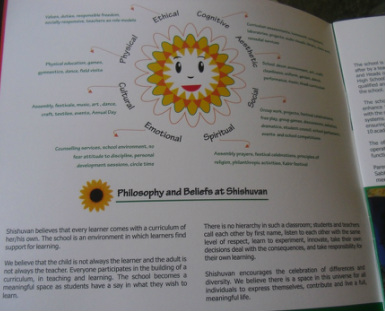 There are a handful of schools I visit and think: I would be happy to send my own children there; this is definitely one of them.
There are a handful of schools I visit and think: I would be happy to send my own children there; this is definitely one of them.
The school is unusual, to my mind, in having a very clear philosophically rooted vision, which infuses all aspects of school life – that vision is ‘being based on Gandhian principles’. This brings with it a series of consequences of which this is a sample:
‘The school is run as a democracy’… everything in quotations in this post is from Anoushka, a IX Grade student (aged 14/15) who showed us around. She had this role because she is ‘Minister for External Affairs’ (Foreign Minister).
Other ministries include Law and Justice and Human Development – they might be called upon to deal with two students who have fought each other – investigating the causes and providing mediation. It was recently put before the Home Ministry that showers should be provided for students for use after sports lessons – ‘because we really smelled’, ‘it took three weeks, but they got them installed’. Students have huge responsibility – in negotiation with the relevant teachers – for the operation of the school.
I asked about problems within the school and Anoushka described a teacher who was behaving rudely unpleasantly to students. Her class, and the other IX Graders, raised this in their circle time with their teacher. This was taken on – and the teacher cam to see them, explained their actions and promised to act in a more polite way. I’ve never heard of teacher-student relations run like this – except perhaps at Summerhill.
There were many other aspects of the school which were unusual and intriguing. The Ghandian ones ranged from the address forms for teachers ‘I call even the prinicipal Neha’ (without any of the usual English or Hindi honorific suffixes), to the students’ role in spinning cotton and weaving their own cloth – keeping them in touch with the method by which their uniforms are created – unisex, handmade in India by a women’s co=operative, and following Ghandi’s example. There was much else about the school as well – like the play room which younger students visited once a week and the avoidance of any form of textbooks until IX Grade (when then exam courses begin).
Two caveats are due – firstly, I only passed by lessons – and the impressions were superficial (if positive) – students appeared to be studying hard, teachers were present in the classrooms and engaged – but I can’t really assess the in-lesson pedagogy. My suspicion though, is that students who are so positive about the school and their teachers must be doing fairly well. Secondly, it was mentioned to me afterwards that almost all the students are going to evening ‘crammer’ schools as well, for two or three hours every night. Is this just parents with very high expectations for their children? Are they supplementing or substituting for the work of the school?
Paolo Freire’s maxim from Pedagogy of the Oppressed: ‘A real humanist can be identified more by his trust in the people, which engages him in their struggle, than by a thousand actions in their favour without that trust,’ is one I both believe in and struggle with. Many teachers and school leaders fail to identify and share their visions effectively. Many have strong visions and do share them – and some go further, using this to prioritise the needs of their students above the conflicting demands of government, local communities and the myriad other groups seeking to influence and adapt the purposes and practices of education. Shushivan is the first school I have visited that not only succeeds in this, but, in doing so, pursues a vision which is wholeheartedly humanist in aim and effect.
[Originally published 20th February, 2013]

